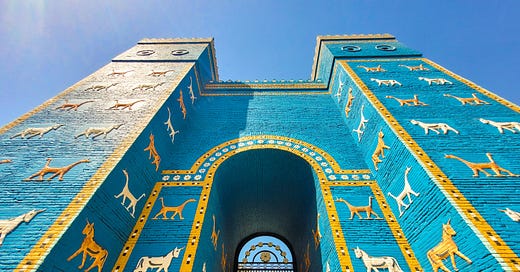Paid subscribers get instance access to all posts and recordings on The Chained Muse. Renaissance Patrons receive full access to both The Chained Muse and Age of Muses, along with our entire PDF archive. Additionally, Renaissance Patrons receive to complimentary hard copies of our magazine (we’ll contact you for mailing).
Leaving Babylon
After a Captor’s Dream
1
It’s hard to remember a time without him,
when that bouncing top-knot wasn’t busy
about the house, scouring our brazen goblets
at the well, or at awkward play with my siblings
in the courtyard, tossing this way and that.
Like a young camel’s tuft, his jet-black ringlets
always quivered, as I picture him, in histrionic rage
at some stubborn shopkeeper in the market.
I’d found myself grown quite fond of this old slave,
beetle-browed, onyx-eyed, near to my own age,
but the passage of time has frosted that unruly
raven mop now, endearing as the graying muzzle
of a trusted hound, veteran of countless chases,
who luxuriates in the courtyard shade most days,
indolent, dreaming a dream of thirsty gazelles
pausing warily in the streambeds.
I observed him once, from behind a column
in the market square. (In truth, I enjoyed his company,
walking to the town center and back, me on some
official duty, he to provision the household.)
I observed him once in the marketplace,
haggling, wildly gesticulating, until at last
the adversary millet merchant or chickpea vendor,
shoulders hunched, palms up,
quit the field, yielding to the onslaught,
caving to my man’s bargain.
(He’d always had a nose for advantage
and a tireless commitment to us, his masters.)
And one day I’d left him to the shops
while I sought news of doings in the Palace.
That day, I recall, the news was not good.
My colleagues at the Ministry of Granaries
were full of foreboding, whispering their dread
of the season’s intempestive floods, the obvious
displeasure of Marduk and Ishtar, our deities,
unhappy with the undisciplined priests,
unsettled by the subtle Persians among us,
by our dissolute court, impatient with the rise
of “academies” among the slaves, seated
in their clamorous companies,
disputing their laws,
intoning their barbaric genealogies.
My friends bemoaned those desertions
in the ranks of our armies.
Some said packs of jackals had been spotted
pacing among the rushes by the rivers,
and wolves are often seen now, I’ve heard,
prowling the deserted mansions
at the outskirts of the city.
2
One morning soon thereafter he was gone.
I knew that he had a name, this slave,
the name that he was called among his people,
but we just called him wardum, the summons
employed for all his kind in households such as ours.
Yet he had another name, he must have,
I am certain of it, because from time to time,
at evening, I’d overhear the strains of chatter
through the lattice-window of my study. Drifting
from the captives-house across the courtyard,
I’d catch the jangling melody
of their inelegant Aramaic,
that heavy-throated, honking sound,
like the squabbling of cranes in the tall trees.
His name was spoken in that homely cacophony,
the name this slave was called among his people,
I am certain.
And he was a disputatious fellow, that’s for sure.
I once had to apply the bastinado
to head and shoulders
in the high street just to save him
from a crueler fate, to extricate him
from an angry mob, and protect my investment.
He sulked all the way home
and didn’t speak for a month.
But now he’s gone,
and I might have informed the authorities,
but I did not. To what purpose?
My friends at the ministry
say they’ve watched as long lines of refugees
stream from the city now,
out through the hanging gardens,
out past their sedentary kinsmen,
past the geonim who will remain, out past
the derelict Western Gate,
headed downstream, down-valley,
between the waters, into the barrens,
across the shrinking borders of the empire,
headed toward the impossibly distant sea.
He often spoke of the sea on our walks into town,
yammering in those rude gutturals of an element
he had never known, ancient landscapes
that, I imagine, had to figure large
in the narratives he wildly disputed,
those sultry evenings, among his people.
3
Behind these shuttered windows now,
through which the flickering light
of fires set each night
in this unquiet city disturbs my peace,
I see him still.
Sometimes I imagine him
among his own, in desultory motion,
vaguely wandering, in some small group,
committed only to that imprecise direction,
drawn away into their westward dream,
devoid of all specific destination,
guided only
by stories.
Twilight of the Idols
It wasn’t might or beauty made
the ancient city great not
her majestic miles of snaking parapet
the graceful porticoes
the lofty palace galleries
and date-lined boulevards
the fragrant groves and massive braziers
blazing at the temple door
but the rummage
of her teeming streets the chaos
at her vast capacious heart.
Keep reading with a 7-day free trial
Subscribe to The Chained Muse to keep reading this post and get 7 days of free access to the full post archives.




